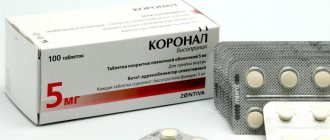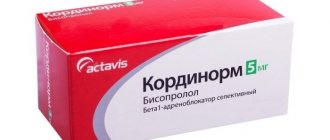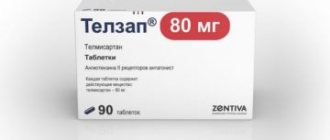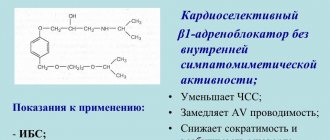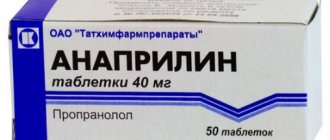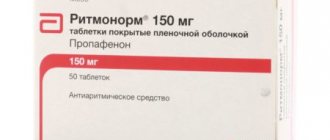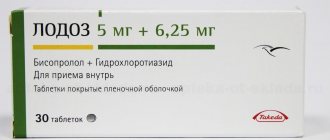Special conditions
Patients using Biprol should be constantly monitored by doctors. What the medicine helps with was described above, and now let’s talk about how to monitor the condition of the patient taking these pills. First of all, heart rate and pressure measurements should be taken; these indicators are very important at the very beginning of therapy. Patients are given an electrocardiogram, and in people with diabetes, a blood test is taken to check glucose levels. In older people, the condition of the renal system is monitored.
The work of external respiration is examined in patients with a history of pulmonary diseases.
Patients should learn to count their own heart rate, and if the rate is less than 50 beats per minute, then they should seek medical help.
During therapy, the production of tear fluid may decrease, which should be taken into account by contact lens owners. In people with diabetes mellitus, the medicine may hide tachycardia caused by hypoglycemia. The drug does not increase hypoglycemia that occurs when using insulin and does not inhibit the recovery of glucose concentrations to normal levels in the blood.
Before surgery, the drug is discontinued two days before general anesthesia. If the patient nevertheless took the tablet before surgery, then the anesthesia drug should have minimal negative inotropic properties.
People with bronchospastic diseases are prescribed cardioselective adrenergic blockers when the use of other antihypertensive drugs is inappropriate. An overdose can provoke bronchospasm.
In elderly people with bradycardia and with a clear decrease in blood pressure, AV blockade, the concentration of the active substance should be reduced or completely stopped therapy using Biprol. Treatment should also be stopped if the patient becomes depressed.
Do not stop therapy if there is a risk of progression of severe arrhythmia and myocardial infarction. Stopping the use of the drug is carried out gradually, reducing the dose over 14 days. The tablets are canceled in advance if a laboratory test of urine and blood is planned for the presence of normetanephrine, catecholamines, etc.
Side effects
the drug Biprol may cause side effects: From the central nervous system and peripheral nervous system: increased fatigue, weakness, dizziness, headache, sleep disorders, depression, anxiety, confusion or short-term memory loss, hallucinations, asthenia, myasthenia, paresthesia in the extremities (in patients with intermittent claudication syndrome and Raynaud's syndrome), tremor. From the organ of vision: blurred vision, decreased secretion of tear fluid, dry and sore eyes, conjunctivitis. From the cardiovascular system: sinus bradycardia, palpitations, impaired myocardial conduction, AV blockade (up to the development of complete transverse block and cardiac arrest), arrhythmias, weakening of myocardial contractility, development (worsening) of chronic heart failure (swelling of the ankles, feet; shortness of breath), decreased blood pressure, orthostatic hypotension, manifestation of vasospasm (increased peripheral circulatory disorders , coldness of the lower extremities, Raynaud's syndrome), chest pain, withdrawal syndrome (increased angina attacks, increased blood pressure). From the digestive system: dry oral mucosa, nausea, vomiting, abdominal pain, constipation or diarrhea, changes in enzyme activity liver (increased ALT and AST), bilirubin levels, liver dysfunction (dark urine, yellowing of the sclera or skin, cholestasis), changes in taste. From the respiratory system: nasal congestion, difficulty breathing when prescribed in high doses (loss of selectivity) and/ or in predisposed patients - laryngo- and bronchospasm. From the endocrine system: hyperglycemia (in patients with type 2 diabetes mellitus), hypoglycemia (in patients receiving insulin), hypothyroid state. Allergic reactions: skin itching, rash, urticaria. Dermatological reactions: increased sweating, skin flushing, exanthema, psoriasis-like skin reactions, exacerbation of psoriasis symptoms. From the hematopoietic system: thrombocytopenia (unusual bleeding and hemorrhage), agranulocytosis, leukopenia. From the reproductive system: weakened libido, decreased potency. Others: back pain, arthralgia, changes in triglyceride levels, withdrawal syndrome (increased angina attacks, increased blood pressure). Effect on the fetus: with the use of the drug, intrauterine growth retardation, hypoglycemia, and fetal bradycardia are possible.
Side effects
Increased fatigue may occur as a side effect of therapy.
Despite good tolerability, the following undesirable effects may develop during therapy for arterial hypertension with Biprol:
- sleep disorder;
- dizziness;
- depression;
- impotence and general weakness;
- anxiety;
- increased fatigue;
- short-term memory loss;
- bradycardia, arrhythmia;
- dry eyes, deterioration of visual function;
- urge to vomit, nausea, painful discomfort in the stomach;
- difficulty breathing, bronchospasm;
- rashes, itching, urticaria.
How to take the pills
The tablet must be taken whole with a small amount of water. Do not chew it, as this will damage the protective shell.
It is advisable to take the medicine in the morning. For taking Biprol 5 mg, the instructions do not introduce restrictions related to food consumption - it can be drunk both before and after meals.
Mechanism of action of beta blockers
Dosage
A constant dosage for daily use of the drug is selected individually for each patient. The use of the drug begins with a titration phase - the amount of the substance entering the body is gradually increased to achieve a positive effect. This process must be supervised by a doctor.
The initial dosage of the drug for each patient is 1.25 mg (half a 2.5 mg tablet) daily. This dosage is needed to check the patient for hypersensitivity to the components of the drug. The first dose of the medicine is carried out under the supervision of a doctor with 4-hour monitoring of blood pressure indicators.
If signs of acute heart failure occur, use of the drug is immediately discontinued. If signs of an allergic reaction do not appear, then the daily portion of the product is gradually increased.
The dosage is increased slowly. Every 2 weeks, daily intake increases by 1.25 mg. This process stops when the doctor finds the minimum dosage that effectively and quickly reduces the patient’s blood pressure.
For the drug Biprol, the indications are serious diseases with a severe course. Therefore, the patient must understand that the course of treatment will be quite long. The exact duration of drug use depends on the characteristics of the course of hypertension in a given patient.
special instructions
In some groups of patients, when taking the drug Biprol, the instructions for use differ slightly from the standard.
This is due to the peculiarities of metabolism in their body. So, if a patient has severe pathologies of the liver or kidneys, he needs a dose adjustment. The titration phase is carried out very slowly, and the maximum dose of the drug that can be taken daily is 10 mg.
Analogues and synonyms
As with any medicine, analogues of the drug Biprol are produced everywhere - both in Russia and abroad. Pharmacological companies produce a number of drugs that are similar in action, but differ in composition, manufacturer and price. The most common synonyms for Biprol are the drugs Bisoprolol and Concor.
Bisoprolol
Bisoprolol is an analogue that contains the same main active ingredient as Biprol - bisoprolol fumarate. Several Russian companies produce the drug:
- Atoll;
- Vertex;
- Izvarino Pharma;
- Rompharma;
- North Star.
On average, the price of the drug is 1.5–2 times lower than Biprol. The company that produced the medicine has a certain influence on the price.
If Bisoprolol is an analogue of the drug Biprol, what does this remedy help with? The medicine has antianginal, antiarrhythmic and hypotensive effects on the body.
Doctors have long been arguing about which is better - Biprol or Bisoprolol. In general, they are almost similar and differ only in minimal changes in composition, so you can use either one or another drug.
Concor is another analogue of the drug Biprol, containing bisoprolol fumarate. It also has antianginal and hypotensive effects on the heart. It is used for the same diseases for which Biprol tablets are used.
The manufacturer of the drug is the German company Merck KGaA. Prices for one package of Concor are significantly higher than for its Russian counterparts. On average, the cost of the medicine is 1.5–2 times more than the price of Biprol.
What is better - Biprol or Concor - many patients wonder. It is impossible to answer this question unambiguously. Concor is produced by a proven German company, rightfully considered one of the leading pharmacological companies in Europe. Biprol is a Russian product that is produced by domestic companies, but its price is several times lower.
The drug Concor has one important advantage. Biprol contains lactose, a substance to which some people may develop intolerance.
This limits the use of the drug. Concor does not contain lactose, so it can be prescribed to people intolerant to this substance.
What is the composition and release form of Biprol?
Biprol is a new generation medicine, part of the group of beta-blockers. Country of origin: Russia. The international name of the drug Biprol is Bisoprolol. The average cost of the drug varies from 150 to 300 rubles.
Biprol - tablets that have a white tint on the inside and a yellow outer shell. The active component of the drug is bisoprolol fumarate. Depending on the content of the active substance in one tablet, there are two main types of Biprol: 5 and 10 mg.
Additional substances included in the drug: lactose monohydrate, cellulose, corn starch, povidone, magnesium stearate, colloidal silicon dioxide, collidon.
Biprol
At the moment, Biprol is available in cardboard packages containing from 3 to 10 blisters of 10 tablets each.
It is worth noting that the drug is sold in pharmacies only by prescription!
The drug Biprol instructions for use
This medicine is taken orally, without chewing, with a sufficient amount of water. Experts recommend taking Biprol tablets in the morning on an empty stomach or during breakfast. The maximum dose of medication for adult patients is 20 mg/day
It is important to note that the dosage regimen and dosage of Biprol is selected individually by the attending physician, taking into account the success of treatment, as well as the patient’s pulse rate.
Unless the doctor prescribes otherwise, according to reviews of Biprol, patients with coronary heart disease and arterial hypertension should take 10 mg of the drug once a day. At the beginning of treatment, a dosage of 5 mg of Biprol may be recommended. Exceeding the dosage of the drug is justified only in rare cases. Persons suffering from mild kidney and liver diseases, as well as elderly patients, often do not require special dosage selection.
For patients with severe liver and kidney dysfunction (creatinine clearance less than 20 ml/min), the daily dosage should not be more than 10 mg of the drug. Biprol is recommended for use in patients with moderate to severe chronic heart failure who have been stabilized for the past six weeks. According to the instructions for Biprol, when treating CHF (chronic heart failure), you must adhere to the following treatment regimen:
- The initial dose of the drug is 1.25 mg 1 time per day for 7 days.
- From 8 to 14 days of therapy, 2.5 mg of the drug per day is prescribed.
- Starting from the third week, the dose is increased to 3.75 mg per day.
- At 4–8 weeks of treatment, 5 mg is used, after which the dosage is increased to 7.5 mg (week 8–12).
- After three months of treatment, the maximum dosage can be prescribed, which is 10 mg.
Taking into account individual tolerance, the dose of the drug can be adjusted by the attending physician. It is important to examine patients with CHF within 4 hours after starting therapy with Biprol at an initial dose of 1.25 mg for worsening symptoms of CHF, changes in blood pressure and heart rate.
Contraindications
The use of Biprol is contraindicated in Prinzmetal angina, shock, acute heart failure, sinoatrial block, collapse, second and third degree AV block, pulmonary edema, severe bradycardia, as well as in cases of hypersensitivity to the components included in the drug.
Biprol is not prescribed simultaneously with MAO inhibitors to patients with chronic heart failure in the stage of decompensation, bronchial asthma, chronic obstructive pulmonary disease, cardiomegaly, sick sinus syndrome and arterial hypotension.
Also, the use of Biprol is contraindicated in children under 18 years of age, with pheochromocytoma and metabolic acidosis.
Biprol is prescribed with caution to elderly patients, with liver failure, psoriasis, chronic renal failure, diabetes mellitus, myasthenia gravis, thyrotoxicosis and first-degree atrioventricular block.
Interaction with other drugs
Biprol therapy increases the risk of severe systemic allergic reactions or anaphylaxis. When used simultaneously with bisoprolol, iodine-containing x-ray contrast drugs for intravenous administration increases the risk of developing anaphylactic reactions. When prescribed simultaneously, with bisoprolol, phenytoin for intravenous administration, drugs for inhalation general anesthesia (hydrocarbon derivatives) increase the severity of the cardiodepressive effect and the likelihood of lowering blood pressure. When used simultaneously, bisoprolol changes the effectiveness of insulin and oral hypoglycemic drugs, masks the symptoms of developing hypoglycemia (tachycardia, increased blood pressure When used simultaneously, bisoprolol reduces the clearance of lidocaine and xanthines (except diphylline) and increases their concentration in plasma, especially in patients with initially increased clearance of theophylline under the influence of smoking. The hypotensive effect of bisoprolol is reduced by NSAIDs (Na+ retention and blockade of prostaglandin synthesis by the kidneys), GCS and estrogens (Na+ ion retention). When used concomitantly, cardiac glycosides, methyldopa, reserpine and guanfacine, calcium channel blockers (verapamil, diltiazem), amiodorone and other antiarrhythmic drugs increase the risk of developing or worsening bradycardia, AV block, cardiac arrest and cardiac arrest. insufficiency. When used simultaneously with bisoprolol, nifedipine can lead to a significant decrease in blood pressure. When used simultaneously with bisoprolol, diuretics, clonidine, sympatholytics, hydralazine and other antihypertensive drugs can lead to an excessive decrease in blood pressure. Bisoprolol prolongs the effect of non-depolarizing muscle relaxants and the anticoagulant effect of coumarins. Three - and tetracyclic antidepressants, antipsychotic drugs (neuroleptics), ethanol, sedative and hypnotic drugs enhance the inhibitory effect of bisoprolol on the central nervous system. The simultaneous use of bisoprolol with MAO inhibitors is not recommended due to a significant increase in the hypotensive effect (the interval between taking MAO inhibitors and bisoprolol should not be less than 14 days). When used simultaneously with bisoprolol, non-hydrogenated ergot alkaloids and ergotamine increase the risk of developing peripheral circulatory disorders. When used simultaneously, sulfasalazine increases the concentration of bisoprolol in plasma. When used simultaneously, rifampicin reduces T1/2 of bisoprolol.
Biprol overdose
Symptoms : arrhythmia, ventricular extrasystole, severe bradycardia, AV block, marked decrease in blood pressure, acute heart failure, hypoglycemia, acrocyanosis, difficulty breathing, bronchospasm, dizziness, fainting, convulsions.
Treatment: gastric lavage, administration of adsorbents, symptomatic therapy. For severe bradycardia, intravenous administration of atropine. If the effect is insufficient, a drug with a positive chronotropic effect can be administered with caution. Sometimes temporary placement of an artificial pacemaker may be necessary. In case of developed AV block - intravenous administration of 1-2 mg of atropine, epinephrine or installation of a temporary pacemaker. For ventricular extrasystole - lidocaine (class IA drugs are not used). If there is a pronounced decrease in blood pressure, the patient should be transferred to the Trendelenburg position; if there are no signs of pulmonary edema, intravenous administration of plasma-substituting solutions; if they are ineffective, administration of epinephrine, dopamine, dobutamine (to maintain chronotropic and inotropic effects and eliminate a pronounced decrease in blood pressure). For hypoglycemia, intravenous administration of dextrose (glucose) solution may be indicated. For heart failure - cardiac glycosides, diuretics. For convulsions - intravenous diazepam. For bronchospasm - inhaled β2-adrenergic agonists.
Interaction with drugs and alcohol
Any dosage of medication with alcohol is contraindicated
When taking Biprol, as medical reviews about the drug indicate, it is imperative to take into account its drug interactions with other medications.
The combination of the drug with diuretics leads to a critical decrease in blood pressure. An increased inhibitory effect on the nervous systems is observed when Biprol interacts with psychotropic drugs.
The medicine has the ability to catalyze the action of drugs of the hypoglycemic group. A weakening of its effectiveness occurs when taking tablets simultaneously with non-steroidal drugs, estrogens and glucocorticoids.
The patient is at increased risk of developing a deep form of bradycardia if he simultaneously takes this beta-blocker along with calcium antagonists or cardiac glycosides.
It is prohibited to combine the drug with alcohol.
Biprol substitutes
Pharmacological companies produce a huge number of drugs every year. Therefore, if necessary, the cardiologist will always select an analogue of the medicine with which to help patients. Structural substitutes for Biprol include: Coronal, Conocor, Bisoprolol, Concor Cro.
- Coronal. Manufacturer: Slovak Republic. Cost from 200 to 500 rubles.
- Concor is a popular drug produced in Germany. The price varies from 220 to 500 rubles.
- Bisoprolol is one of the most common drugs, produced in Israel. Cost from 100 rubles.
- Concor Cor is a medicine that is also produced in Germany. It has a fairly strong effect. The average price is 200 rubles.
Analogue
The difference in the effectiveness of these drugs is minimal.
Biprol is an effective drug used to treat pathologies of the heart and blood vessels. Sold in pharmacies only by prescription.
Instructions
Biprol comes with detailed instructions for use. It states that the tablets should be taken with water in the morning once a day.
You can take the medicine with food or separately, this does not affect its effect in any way.
It is important to swallow the tablets whole and do not chew them. . Titration phase
Titration phase
At the very beginning of using the drug, it is necessary to carry out a titration phase. The patient should be under constant medical supervision during this time.
You should start with a dose of 1.25 mg, which is half a 2.5 mg tablet. If hypersensitivity is not detected, treatment is continued. The daily dosage should be changed gradually, increasing it by 1.25 mg every 2 weeks. Or every 4 weeks, if there is doubt about the patient’s tolerability of the medication.
If undesirable effects occur, the dose of tablets should be reduced again. The maximum daily dosage cannot exceed 10 mg.
After taking the first dose of 1.25 mg, it is necessary to monitor your blood pressure for 4 hours.
After taking the first dose of 1.25 mg, it is necessary to monitor blood pressure and pulse for 4 hours, and monitor whether symptoms of exacerbation of heart failure appear. At this stage, it is possible to discontinue the drug.
During the titration phase, an increase in pressure, bradycardia, and temporary deterioration of the patient’s condition with CHF cannot be ruled out. In such cases, the dosage of the medication should be adjusted and the patient prescribed diuretics, possibly in combination with ACE inhibitors.
Duration of taking the drug
When prescribing Biprol, the patient must understand that treatment with this drug will be long-term. The exact duration of taking the drug is always determined by the doctor in relation to a specific patient and his state of health.
Elderly patients
No dosage adjustment is required for patients of retirement age. They can be treated with Biprol according to the standard regimen specified in the instructions.
No dosage adjustment of Biprol is required for patients of retirement age.
It is not recommended to treat patients under 18 years of age with Biprol.
Children
There are not enough studies done to prove the safety of using Biprol in minors. Therefore, patients under 18 years of age are not recommended to be treated with this drug.
Patients with impaired renal and liver function
Patients with impaired renal function (creatinine).
Patients suffering from concomitant diseases
It is still unknown for sure how the use of Biprol can affect the condition of patients with CHF who are also diagnosed with the following ailments:
- type 1 diabetes mellitus;
- restrictive cardiomyopathy;
- severe abnormalities in the functioning of the liver and (or) kidneys;
- myocardial infarction that occurred less than 3 months ago;
- congenital defects of the heart or its valves.
If you have a history of any of the listed diseases, the doctor may decide to prescribe Biprol. However, the patient must strictly follow the recommendations and regularly come to see the doctor.
For type 1 diabetes, Biprol should be taken with caution.
Biprol pharmacokinetics
Suction
Absorption is 80–90%; food intake does not affect the absorption of the drug. Tmax in blood plasma is 1–3 hours. Bioavailability is about 90%. Communication with blood plasma proteins is about 30%.
Distribution
Vd is 3.5 l/kg. Permeability through the BBB and placental barrier is low.
Metabolism
Metabolized in the liver with the participation of isoenzymes CYP3A4 (up to 95%) and CYP2D6. The effect of first pass through the liver is insignificant (about 10%). The biotransformation of bisoprolol is not accelerated in patients with hyperthyroidism.
Removal
Total clearance is (15.6±3.2) l/h, renal clearance is (9.6±1.6) l/h. The balanced clearance of bisoprolol is determined by the balance between its excretion through the kidneys unchanged (about 50%) and oxidation in the liver (about 50%) to inactive metabolites, which are then also excreted by the kidneys; less than 2% is excreted through the intestines (with bile). Does not accumulate in the body. T1/2 - 9–12 hours.
The dose dependence of the pharmacokinetics of bisoprolol is linear.
The pharmacokinetics of bisoprolol is stable and does not depend on the age and gender of the patient.
Pharmacokinetics in special clinical situations
Kidney failure . In case of severe renal dysfunction (Cl creatinine less than 20 ml/min) and in patients with anuria, T1/2 may increase more than 2 times.
Liver failure . In case of severe liver failure, an increase in T1/2 to 13–15 hours is noted.
CHF. In patients with CHF (functional class III according to the NYHA classification), the concentration of bisoprolol in the blood plasma is higher than in healthy volunteers, and T1/2 increases to 17 hours.
Overdose
It is strongly recommended that you follow the doses prescribed by your doctor when taking the medicine "Biprol" instructions for use. Reviews claim that this drug is worthy of attention. It is effective and inexpensive, but overdose symptoms may occur if more than the prescribed dose is used. They are expressed in the form of arrhythmia, ventricular extrasystole, and obvious bradycardia. Overdose can cause AV blockade, a noticeable decrease in blood pressure, heart failure, cyanosis of the nail plate, bronchospasm, convulsions, dizziness, difficulty breathing.
Analogues of the drug according to ATC codes:
ARITHEL BIDOP BIOL BISOGAMM BISOKARD BISOPROLOL CONCOR CONCOR COR CORBIS CORDINORM CORONAL NIPERTENE All
Before using the drug BIPROL you should consult your doctor. These instructions for use are for informational purposes only. For more complete information, please refer to the manufacturer's instructions.
special instructions
When taking Biprol, regular monitoring of the patients' condition is required. It should include measuring heart rate and blood pressure (daily at the beginning of treatment, then once every 3-4 months), conducting an ECG, determining blood glucose in patients with diabetes (once every 4-5 months). In elderly patients, it is recommended to monitor kidney function (once every 4 to 5 months).
Before starting treatment, it is recommended to conduct a study of external respiratory function in patients with a history of respiratory diseases.
The patient should be trained in the method of calculating heart rate and instructed about the need for medical consultation if the heart rate is less than 50 beats/min.
Patients using contact lenses should take into account that during treatment there may be a decrease in the production of tear fluid.
When using Biprol in patients with pheochromocytoma, there is a risk of developing paradoxical arterial hypertension (if effective blockade of α-adrenergic receptors is not previously achieved).
In case of thyrotoxicosis, Biprol can mask certain clinical signs of thyrotoxicosis (for example, tachycardia). Abrupt withdrawal in patients with thyrotoxicosis is contraindicated, since in this case the symptoms may worsen.
In diabetes mellitus, the drug can mask tachycardia caused by hypoglycemia. Unlike non-selective beta-blockers, it practically does not enhance insulin-induced hypoglycemia and does not delay the restoration of blood glucose concentrations to normal levels.
When taking clonidine simultaneously, it can be discontinued only a few days after Biprol is discontinued.
It is possible that the severity of the hypersensitivity reaction may increase and there will be no effect from normal doses of epinephrine in patients with a history of allergic reactions.
If planned surgical treatment is necessary, the drug should be discontinued 48 hours before the start of general anesthesia. If the patient took the drug before surgery, he should select a drug for general anesthesia with minimal negative inotropic effect.
Reciprocal activation of the vagus nerve can be eliminated by intravenous atropine (1-2 mg).
An overdose in persons suffering from bronchospastic conditions is dangerous for the development of bronchospasm.
If increasing bradycardia (less than 50 beats/min), a pronounced decrease in blood pressure (systolic blood pressure below 100 mm Hg), or AV blockade is detected in elderly patients, it is necessary to reduce the dose or stop treatment.
It is recommended to discontinue therapy if depression develops.
Treatment should not be abruptly interrupted due to the risk of developing severe arrhythmias and myocardial infarction. Cancellation is carried out gradually, reducing the dose over 2 weeks or more (by 25% in 3-4 days).
The drug should be discontinued before testing the levels of catecholamines, normetanephrine and vanillinmandelic acid in the blood and urine; antinuclear antibody titers.
During the treatment period, care must be taken when driving vehicles and engaging in other potentially hazardous activities that require increased concentration and speed of psychomotor reactions. .
pharmachologic effect
A selective beta1-blocker without internal sympathomimetic activity and does not have membrane stabilizing properties.
Reduces plasma renin activity, reduces myocardial oxygen demand, reduces heart rate at rest and during exercise. It has hypotensive, antiarrhythmic and antianginal effects. When used in low doses, it blocks β1-adrenergic receptors of the heart, reduces catecholamine-stimulated formation of cAMP from ATP, reduces the intracellular current of calcium ions, has a negative chrono-, dromo-, bathmo- and inotropic effect, inhibits conductivity and excitability, and reduces myocardial contractility.
When used in high doses, it has a beta2-adrenergic blocking effect.
OPSS at the beginning of drug use (in the first 24 hours) increases (as a result of a reciprocal increase in the activity of α-adrenergic receptors and elimination of stimulation of β2-adrenergic receptors), then after 1-3 days it returns to the original level, and with prolonged use of the drug it decreases.
The hypotensive effect is associated with a decrease in minute blood volume, sympathetic stimulation of peripheral vessels, a decrease in the activity of the renin-angiotensin system (of great importance for patients with initial hypersecretion of renin), restoration of sensitivity in response to a decrease in blood pressure and an effect on the central nervous system. In arterial hypertension, the initial effect occurs after 2-5 days, stable - after 1-2 months.
The antianginal effect is due to a decrease in myocardial oxygen demand as a result of a decrease in heart rate and decreased contractility, prolongation of diastole, and improved myocardial perfusion. By increasing end-diastolic pressure in the left ventricle and increasing the stretch of ventricular muscle fibers, it can increase myocardial oxygen demand, especially in patients with chronic heart failure.
The antiarrhythmic effect is due to the elimination of arrhythmogenic factors (tachycardia, increased activity of the sympathetic nervous system, increased cAMP content, arterial hypertension), a decrease in the rate of spontaneous excitation of sinus and ectopic pacemakers and a slowdown of AV conduction (mainly in the antegrade and, to a lesser extent, in the retrograde directions via the AV node) and along additional paths.
When used in average therapeutic doses, in contrast to non-selective beta-blockers, it has a less pronounced effect on organs containing β2-adrenergic receptors (pancreas, skeletal muscles, smooth muscles of peripheral arteries, bronchi and uterus) and on carbohydrate metabolism, does not cause delay sodium ions in the body; the severity of the atherogenic effect does not differ from the effect of propranolol. When used in high doses (200 mg or more), it has a blocking effect on both subtypes of β-adrenergic receptors, mainly in the bronchi and vascular smooth muscles.
